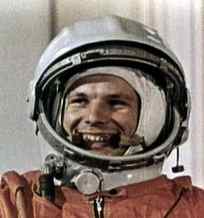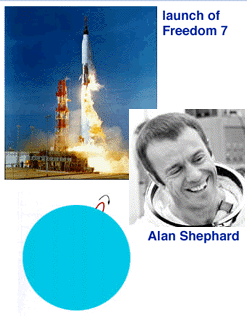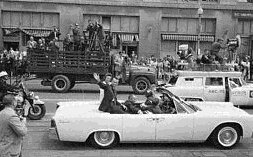

In April 1961, in a field near the village of Smelovaka in Russia, two farm workers look up to see a man parachuting down towards them. He is wearing a bright orange suit and a white helmet. When he lands they approach him and ask "Have you come from outer space?"
"Yes, yes, would you believe it' he answered with a big grin, "I certainly have".
 The man in the orange space suit was Yuri Gagarin and he was indeed returning to earth after becoming the first man to travel in space.
Sputnik had been a great achievement and a ground-breaking event but this was even better. The Russians could present the first real spaceman to the world's press.
The man in the orange space suit was Yuri Gagarin and he was indeed returning to earth after becoming the first man to travel in space.
Sputnik had been a great achievement and a ground-breaking event but this was even better. The Russians could present the first real spaceman to the world's press.
Alan Shepard had been selected by NASA to be the first of the Mercury 7 to travel in space and Shepard fully expected to be the first human to do so. Instead he was woken up in the middle of the night by a phone call from a NASA official, "They've done it, the Russians have put a man in orbit".
John Glen, another of the Mercury 7 astronauts, summed up the dark mood around NASA, 'They beat the pants off us, thats all. There's no kidding ourselves about that'.
In Washington a new young president, John F Kennedy, had to decide whether to concede space to the Russians and try to beat them in other spheres of science, or to take them on and try to beat them.
Politically Kennedy was under a lot of pressure after the fiasco of the failed Bay of Pigs invasion of Cuba. He knew that he needed to make a bold statement to the American people.
 On 5th May 1961 Alan Shepard was carried into orbit in the Freedom 7 spacecraft. Unlike Gagarin's complete orbit of the earth, Shepard's flight was much shorter. The whole flight lasted just fifteen minutes and Shepard splashed down just over 300 miles away.
On 5th May 1961 Alan Shepard was carried into orbit in the Freedom 7 spacecraft. Unlike Gagarin's complete orbit of the earth, Shepard's flight was much shorter. The whole flight lasted just fifteen minutes and Shepard splashed down just over 300 miles away.
Despite the flight being so brief in comparison to Gagarin's, America now had it's own astronaut and Shepard became a national hero.

Kennedy called the Mercury 7 astronauts to Washington and while they were there he discussed the possibility of sending a manned spacecraft to loop around the moon and return to earth.
Twenty days after Shepard's flight the Mercury astronauts gathered in the pilots office at Langley Airforce Base to listen to Kennedy's speech to congress regarding the future of the space program.
Kennedy's speech was emphatic,
![]() "I believe this nation should commit itself to achieving the goal before the decade is out of landing a man on the moon and returning him safely to earth".
"I believe this nation should commit itself to achieving the goal before the decade is out of landing a man on the moon and returning him safely to earth".
Back at Langley airforce base the astronauts listened with disbelief. The idea of a slingshot around the moon was ambitious but the president had just announced that America was going to land a man on the moon.
Gordo Cooper turned to the others, "It just ain't possible. First we don't have the rockets, second we don't have the spacecraft and third by god we don't even know how to navigate our way out there and back".
Deke Slayton, a former airforce pilot replied "Hey Gordo, don't forget Kennedy's a navy man like Shepard. We've got only 15 minutes flying time in space and now he figures he could just get us a road map, or we can follow the railtracks all the way to the moon. That's the way a navy pilot would get us there, following the railtracks".
Gus Grissom was more succinct, "the president is nuts".
Whatever the feeling among the astronauts, the space race now had a finishing line. A man on the moon.

 Page 2 |
 Page 4 |
